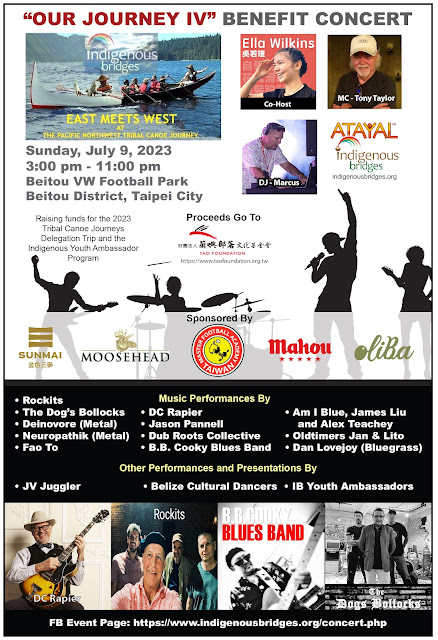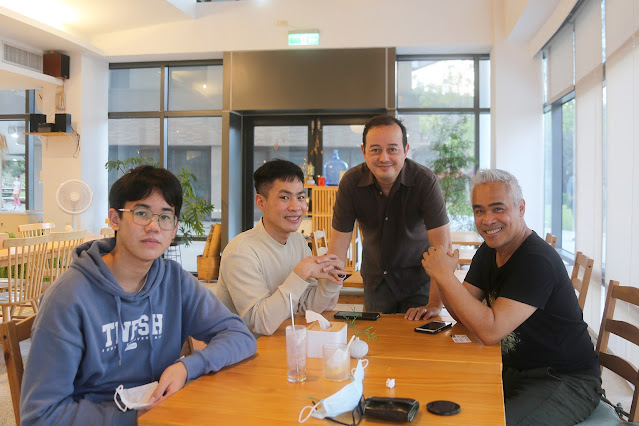2022 Indigenous Bridges Virtual Conference
Revitalizing Indigenous Tourism In The Post-Pandemic World
A virtual cultural exchange event of the Indigenous Bridges Youth Ambassador Program (IBYAP) hosted by the ATAYAL Organization.
Vision Statement
This virtual cultural exchange conference and exhibit strives to build connections between indigenous youth that starts with interactive culture-sharing opportunities that promote understanding. From the position of mutual respect and understanding, we offer a platform of learning and problem-solving activities that build leadership potential. While the pandemic has forced many of us to remain apart, technology has allowed our generation to remain connected digitally, where we can continue to advocate methods of sustainable development and environmental protection while respecting cultural traditions.
Objectives
The virtual cultural exchange event of the Indigenous Bridges Youth Ambassador Program (IBYAP) seeks to achieve four goals:
1) Strengthen the ability of the participants to share their Indigenous culture in English in an international setting.
2) Create a platform for interaction and discussion between Indigenous youth of different tribes and nations.
3) Provide a learning opportunity for participants to learn from perspectives of Indigenous leaders on the topic of Revitalization of Indigenous Tourism in the Post-Pandemic World, which should include:
a) Sustainable practices
b) Community involvement and distribution of benefit
c) Community stewardship
d) Carbon neutral targets
4) Collect measurable data of the participants and the guest speaker in order to improve future online events.
Description
Virtual Culture Exchange
Before the virtual cultural exchange event of the Indigenous Bridges Youth Ambassador Program (IBYAP) the delegates (students) will be preparing a written essay (in English) and a video (3-5 minutes long) introducing themselves and aspects of their Indigenous culture. In Taiwan, a team of volunteer English teachers will be available to help students to improve their English presentations. A web page will be created to showcase the Indigenous Bridges Youth Ambassadors in the USA, Taiwan and other nations. Their essays and videos will be their introductions for the youth delegates to get to know each other. Each delegate will receive a special private IBYAP e-mail box to facilitate communication between delegates.
A panel of judges will select the 2021-2022 Indigenous Bridges Youth Ambassadors from the presentations provided by the delegates. The IBYAP ambassadors will be awarded scholarships, and will be eligible for future culture exchange trips. The term lasts for one year.
Gary Smoke and other Volunteer English Teachers are helping Indigenous students improve their cultural presentations and English communication.
Virtual Conference
The Virtual Conference portion of the event will have a different topic each year. This year’s topic is: Indigenous Tourism Revitalization in the Post-Pandemic World. The Virtual Conference, which will be hosted on Google Meets, will consist of two parts.
Part One will have four Guest Panelists who will share about revitalization of Indigenous Tourism in their local area. Two guest panelists will be from the USA, and two will be from Taiwan. Each guest panelists will have 7 minutes to introduce themselves and their work, and then take part in 40 minutes of discussion on the topic of Indigenous Tourism Revitalization, followed by 30 minutes of Q&A.
Part Two will have Volunteer Coordinator Johan Coolidge and the Indigenous Bridges Youth Ambassadors introduce themselves and their culture for 20 minutes, followed by 50 minutes of conversation on the topic of Indigenous Tourism from the viewpoint of the different Indigenous communities.
Measurements and Results
Quantitative measurements for this event can be measured easily in the number of attendees of the online conference lectures. Also, during the online culture exchange activities, we can measure the number of views for the culture sharing videos and the amount of traffic to the web pages.
Qualitative measurements will require more time. However, after the lecture sessions, our attendees will be given questionnaire forms to fill out, in order to determine what they learned from the lectures, and to measure the effectiveness of the guest speakers to deliver their material. We will also determine constructive criticism in order to improve our events in the future.
A written report will be provided to the Council of Indigenous Peoples (原住民族委員會) and other partners of IBYAP.
Indigenous Bridges Youth Delegates
In this initial event, there will be international delegates, consisting of Indigenous students from Taiwan and the USA. In future, we will include more delegates from more tribes in more nations. The students will be given an online platform for language training from volunteer teachers. Also, there will be opportunities for the Indigenous Youth delegates to interact, have discussions and host workshops on the IBYAP Google Classroom and Google Meets. We will provide a secure, private e-mail address for each IBYAP delegate.
There will be a conference call during this event where Yukan Sabi shares his international cultural exchange experiences with the Tribal Canoe Journeys and answers the questions of other youth delegates. During the event, there will be a web page sharing all stories (essays) and videos produced by all Indigenous Bridges youth delegates. This is part of the virtual cultural exchange portion of the event.
View Sample of Cultural Essay | View Sample of Cultural Video
Guest Speakers
In this initial event, there will be guest speakers who will speak on the topic: Revitalizing Indigenous Tourism in the Post-Pandemic World. There should be at least one guest speaker from Taiwan and one guest speaker from Washington State.
Guest Speakers To Be Announced
Organizers
The ATAYAL Organization, the caretakers of the Indigenous Bridges Youth Ambassador Program (IBYAP) is the official host and organizer of this event. The organization is a 501(c)(3) nonprofit organization founded in the State of Florida in 2001, and it is currently registered in Florida and Washington State.
Partners
The following partners are working with ATAYAL Organization's Indigenous Bridges Youth Ambassador Program (IBYAP) to ensure the success of this event.
Nisqually Indian Tribe - The Nisqually Tribe of Washington State was the first to invite a Taiwanese Indigenous delegation to participate in the Tribal Canoe Journeys. Nisqually Tribal Council Member Hanford McCloud is a Board Member of the ATAYAL Organization, providing oversight. The tribe
has provided funding and resources for international c
ulture exchange activities. They have also hosted Taiwanese indigenous delegations and will provide opportunities to interact with Nisqually youth.
Lummi Indian Tribe - The Lummi Tribe of Washington State hosted the Taiwanese Indigenous delegation at the 2019 Tribal Canoe Journeys and will take part in ongoing culture exchange activities with Taiwan. They have also hosted Taiwanese indigenous delegations and will provide opportunities to interact with Lummi youth.
National Dong Hwa University (國立東華大學)
- The Department of Indigenous Studies at National Dong Hwa University has committed to working with the IBYAP program. Having one of the strongest departments in Asia for the empowerment of indigenous students, and our program will work with these students providing our cultural exchange opportunities, English language instruction and leadership training..
 |
| Tony Coolidge visits Indigenous students at National Dong Hwa University in 2011. |











Comments
Post a Comment